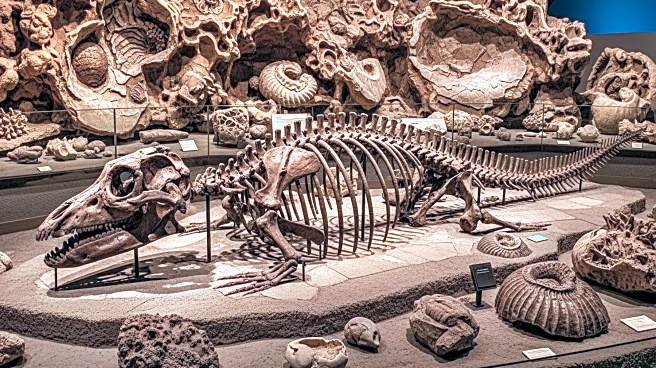What's Happening?
A remarkable ichthyosaur fossil, dubbed the Sword Dragon of Dorset, has been uncovered along the Jurassic Coast of the United Kingdom. Discovered by collector Chris Moore, the fossil is the most complete of its kind ever found, providing a rare glimpse into marine ecosystems of the early Jurassic period. The specimen, formally named Xiphodracon goldencapensis, bridges a crucial gap in understanding ichthyosaur evolution during the Pliensbachian period. Unlike many ichthyosaur fossils, this specimen remained fully three-dimensional, allowing scientists to examine its anatomy in life-like detail. The fossil's massive eyes and elongated snout suggest it was a predator adapted to hunting squid and small fish.
Why It's Important?
The discovery of the Sword Dragon of Dorset is significant for paleontology, as it offers new data on species diversity and evolution during the early Jurassic period. The fossil's exceptional preservation provides an unmatched opportunity to study the anatomy of Pliensbachian ichthyosaurs, contributing to a deeper understanding of marine life from 190 million years ago. This find also highlights the importance of fossil conservation along the Jurassic Coast, a World Heritage Site known for its abundance of fossils. The specimen's study could lead to new insights into ecological turnover during the early Jurassic, impacting theories on marine predator evolution.
What's Next?
Following the discovery, the fossil has been displayed at the Charmouth Heritage Coast Centre in Dorset, allowing both researchers and the public to appreciate its significance. The study of this specimen may prompt further research into ichthyosaur evolution and the ecological dynamics of the early Jurassic period. Scientists may continue to explore the Jurassic Coast for additional fossils, potentially uncovering more about the marine ecosystems of that era. The findings could influence future paleontological studies and conservation efforts in fossil-rich regions.
Beyond the Headlines
The discovery of the Sword Dragon of Dorset not only enriches scientific understanding but also underscores the cultural and educational value of paleontological research. Public exhibitions of such fossils can inspire interest in natural history and promote awareness of the importance of preserving geological heritage sites. The fossil's study may also contribute to discussions on the ethical considerations of fossil collection and the role of private collectors in scientific research.









